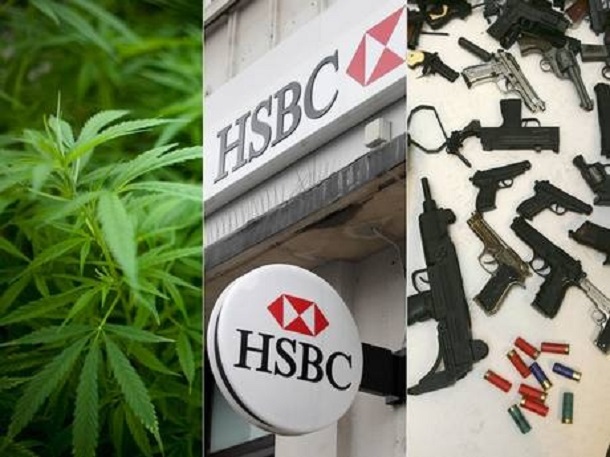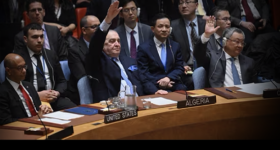21st Century Wire says…
This story should raise some important questions about organised crime’s influence on our judicial and economic systems – in times of crisis.
A recent money laundering investigation by a British Newspaper, The Independent (see story below), reveals a complex accounting and legal shell game of British-based front companies, laundering their illicit proceeds through phony lawsuits, followed by massive wire transfers to Latvian and other banks. Money transfers are effectively rubber stamped by “corrupt Moldovan judges”.
Are these white collar crimes exclusive eastern European gangsters, or do well-known British financial brands also do the same?

FOLLOW THE BALL: Dirty white collar criminals have devised a new complex system to move their funds.
This scam uncovered is said to have lasted four years already, and British and European law enforcement investigators claim that it’s been shut down since May 2014, following a clampdown on the judicial component of the fraud chain – in the former Soviet republic of Moldova.
Yes, this is a scandal of sorts, but how big is it really? Investigators claim over £20 billion has been laundered in this way, but as we will show you – it’s only a drop in the global crime bucket.
What’s more interesting, however, is where the money finally ends up – in the major banks:
“The UK bank accounts involved include ones at UBS in London, HSBC, RBS, NatWest and Citibank. The Independent is passing details of the transactions to the banks.”
Let’s just put this into perspective in relation to some of the world’s largest and “most respected banks” who all seem to be engaged in the macro-money laundering of arms, narcotics, and human trafficking. Take for example, HSBC, a major clearing house for dirty money worldwide.

Bloomberg reported how in 2013, HSBC Holdings Plc agreed to a fine of $1.9 billion with the U.S. to “resolve charges” that it enabled Latin American drug cartels to launder billions of dollars. Initially in 2012, soft-ball media reports claimed that only $881m in drug money was laundered throughout the bank’s accounts, but later the real scale of the laundering was revealed:
“HSBC was accused of failing to monitor more than $670 billion in wire transfers and more than $9.4 billion in purchases of U.S. currency from HSBC Mexico, allowing for money laundering, prosecutors said. The bank also violated U.S. economic sanctions against Iran, Libya, Sudan, Burma and Cuba, according to a criminal information filed in the case. ”
Establishment apologists for the Banksters Boys Club rushed to claimed afterwards that the billions of dollars in dirty money kept the post-housing and banking crash financial system afloat from 2008-2010. This claim is partly true, but the majority of the liquidity came via central banks and bailouts, but the mountain of dirty money is undeniable, and bankers continually benefit from it in order to further line their pockets:
According to the United Nations‘ Drugs and Crime Tsar Antonio Maria Costa, “Inter-bank loans were funded by money that originated from the drugs trade and other illegal activities… There were signs that some banks were rescued that way.”
UN Drugs and Crime records also reveal, “Gangs are now believed to make most of their profits from the drugs trade and are estimated to be worth £352bn“.
International policy smokescreen, like Washington DC’s infamous War on Terror have also provided a smokescreen for opaque agencies like the CIA to profit from criminal enterprises like drugs, money laundering and human trafficking.
The current criminal banking cartel mentioned above has simply replaced the CIA’s former clearing house for its drugs and organized crime fortunes, the Bank of Credit and Commerce International, aka the BCCI. As we reported last year, the current US Secretary of State John Kerry was instrumental at the time as Senate chair of the investigation, in covering up the dirty CIA deals festering throughout the CIA’s classified, and highly criminal, BCCI network.
Read more about the incredible financial network of international elites, found here by author Dean Henderson.
It’s no surprise also, how The Independent, a stalwart of the UK media has also used this latest scandal to hammer home additional anti-Russian rhetoric:
“But rather than being transferred from one legitimate British company to another, the funds were being routed from Russia, where gangs from around the world go to launder money from corruption, drug dealing, prostitution and people smuggling.”
This generalisation that Russia is the center of organised crime is somewhat of a politicised lie.
More amusing is Armitage talking-up Britain’s supposedly advanced and highly “robust legal system” (arguably as corrupt as any other in the world), when any sucker knows that if you are not a member of The Club, you will be destroyed when you step into a British Court frequented by crooks and criminals hiding behind the black robes, who speak their own coded language and wear sheep skins on their heads.
Author Jim Armitage (or his editor) has casually dropped in that sweeping statement, which seems to be attempting to underline a British media narrative that, somehow, that the bulk of global organised crime money goes through Russia, which is not true. It’s another nail in the anti-Russian PR campaign. Very clever and very subtle. Remember, when you see these politicised jibes in British media, you are hearing the voice of MI5.
It’s not just small firms invloved in this fraud, and not just corrupt Moldovan courts either. Which major British firms, holding companies and bent judges are also invloved in the very same practices? Probably more than Armitage or The Independent cares to admit…
Meanwhile, from Moldova…
MONEY LAUNDERING: HOW IT WORKS
CLICK HERE TO SEE THE FULL-SIZED INFOGRAPHIC
The great British money launderette: At least 19 UK firms under investigation for an alleged conspiracy to make $20bn of dirty money
Jim Armitage
The Independent
Front companies in the UK are at the heart of an investigation into one of Europe’s biggest money-laundering operations, allegedly forming part of a conspiracy to make $20bn (£12.5bn) of dirty money look legitimate.
The funds are believed to have come from major criminals and corrupt officials around the world wanting to make their ill-gotten cash appear “clean”, so they can spend it without suspicion.
At least 19 UK-based front companies are under suspicion. The scandal highlights how lax corporate rules have made this country an attractive destination for global organised crime. The secrecy company directors are entitled to under UK law is also hindering attempts to identify the “Mr Bigs” behind the scam.
An investigation by The Independent and the Organised Crime and Corruption Reporting Project, an NGO, has identified dozens of firms in a global web spreading from Birmingham to Belize.
The scam appears to have gone on for four years before being shut down in May by investigators in another of its main centres – the former Soviet republic of Moldova.
Vasile Sarco, an investigating officer in Moldova, told The Independent: “This money was routed from Russia, but the companies incorporated in Britain were instrumental to transit the funds.”
He has sought help from UK organised crime police to help track down the British end of the operation.
Money laundering involves creating the impression that dirty money has been earned through legal means. Criminals need to find ways of coming up with official documentation that testifies to their money’s honest origins. Often, they will take over legitimate businesses which they can then push the money through in fake transactions, generating a paper trail of receipts.
However, when the illicit earnings run into the tens of billions of dollars, such small-scale schemes are impractical. Documentation for much larger amounts of cash is needed.
In the scam exposed today, the launderers created front companies in the UK which carried out massive phoney business deals between themselves. These front companies then sued each other in courts in Moldova, demanding the repayment of hundreds of millions of pounds of loans.
A judge in Moldova, a small Eastern European country whose legal system is not considered as robust as those in Western Europe, would rule in favour of the claimant company, which would then receive the cash from the other front firm – with an all-important signed court document ordering the debt to be paid.
But rather than being transferred from one legitimate British company to another, the funds were being routed from Russia, where gangs from around the world go to launder money from corruption, drug dealing, prostitution and people smuggling.
Their tainted money would first be put into the UK front companies’ accounts in Moldova before being transferred to another bank in Latvia. As Latvia is in the highly regulated European Union banking system, this final stage adds to the dirty money’s “clean” appearance.
Investigators are trying to discover the identities of the criminals whose cash was being laundered. However, this is proving extremely difficult because it is virtually impossible to establish who actually owns the UK front companies – and therefore who ultimately had access to the laundered money.
Investigators said similar laundry systems, often involving UK front companies, were being used by organised crime syndicates and officials as far afield as South America, Syria and Japan. Britain is regularly used in such scams because it is easy to set up front companies here with relatively few, if any, questions asked.
The launderers are able to get the jurisdiction for their legal cases shifted to countries like Moldova, with weaker legal systems, by employing citizens there as guarantors in the fake business transaction. The phony debts were co-guaranteed by Russian companies, who channelled the cash.
Although the British companies were registered at ordinary-looking office buildings in London, Edinburgh, Belfast, Glasgow and Birmingham, their real ownership is hidden by a web of brass-plate entities and nominee directors in secretive havens like the Seychelles, the Bahamas and the Marshall Islands.
For example, one of the companies based in Edinburgh lists its shareholders as two untraceable companies in Panama and Belize.
Another, Westburn Enterprises, claimed a debt of half-a-billion US dollars from a Russian guarantor through the Moldovan courts. Despite purportedly carrying out such vast transactions, it lists its registered address as that of a small accountancy firm, Axiano, in Edinburgh, which is not involved in any wrongdoing. Westburn states that its sole director is Marios Papantoniou, but he is merely the boss of Axiano, and has nothing to do with Westburn’s operations.
Axiano is one of hundreds of British firms which conduct entirely legitimately work as formation agents, setting up companies for clients in a way that allows them to retain their anonymity. When approached by The Independent, Mr Papantoniou explained that he could not answer questions on behalf of his client unless requested to by the police.
Under UK laws, companies can obscure the identity of their owners by using “nominee” directors – people who lend their names to a company without actually having anything to do with them. They can also lend their names to shareholdings in companies to mask who owns them.
Another of the UK businesses alleged to be under investigation is the London-registered Valemont Properties. Its director is Damian James Calderbank, who lists his address (in Companies House filings) variously as being in two Dubai tower blocks and an office building in London. He, too, is thought to be a nominee director and will have been unaware of the company’s activities.
Valemont’s “company secretary”, rather than being a person who could be questioned about its activities, is an outfit called Hextable Limited, based in the Bahamas. Mr Calderbank’s filings say he holds 21 UK directorships, has resigned from 333 more and been a director of 227 UK companies now dissolved. He is also a director in many more offshore companies. Accounts for 2011 show him as a shareholder, through a Gibraltar company, in the Moldovan bank Moldindconbank, through which all the laundered money went. That is again likely to be a nominee shareholding in which he had no real involvement. He did not respond to written and emailed requests to comment.
Two of the 19 front companies give as their registered addresses places which turn out to be branches of the PO boxes chain Mailboxes Etc – one in Edinburgh and the other in Shepherd Market, in Mayfair, London. (There is no suggestion of wrongdoing by Mailboxes Etc.) Three more are registered to a room in a Birmingham office building which is home to nearly 1,300 other companies. Documents from the Moldovan Ministry of Justice show one of those Birmingham companies received half-a-billion dollars in one court award.
None of the companies responded to written requests for comment…
Continue this article at The Independent
READ MORE MONEY LAUNDERING NEWS AT: 21st Century Wire BCCI Files















